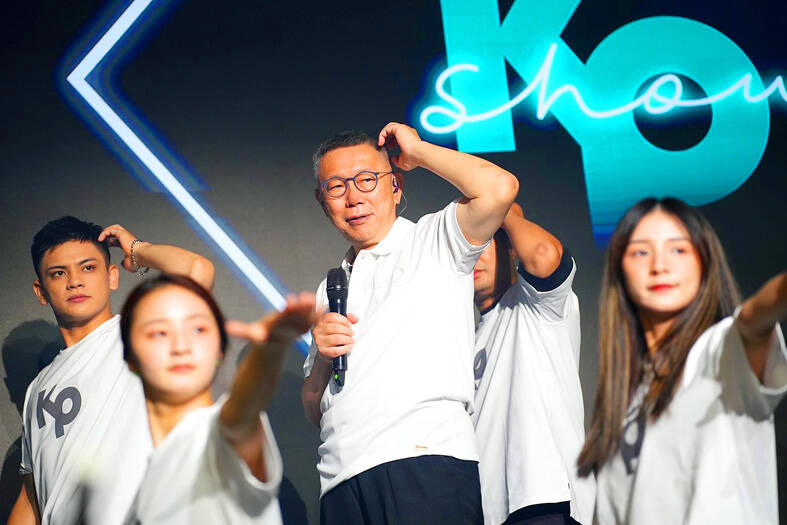The Taiwan People’s Party (TPP) yesterday said the “KP Show” concert it held on July 29 last year was a commercial activity, following a political pundit’s questioning why earnings from the “fundraising” concert was not declared in the party’s political donation disclosure.
Citing the Control Yuan’s open data on political donations, political pundits and a city councilor last week questioned the TPP and its Chairman Ko Wen-je (柯文哲), who was also the party’s presidential candidate in the Jan. 13 election, about allegations of inaccurate disclosure of political donations.
Political pundit Kang Jen-chun (康仁俊) on Saturday afternoon in a post on Threads said that Ko last year said he needed money to run for president and he would organize a fundraising event.

Photo courtesy of the Taiwan People’s Party
The KP Show was organized by the marketing company Muko (木可行銷公關), and commissioned to Neo Creative Marketing Production Co (尼奧創意行銷) for execution, which received NT$3,140,802 (US$96,819) for planning and holding the concert, he said.
Internet personality Liu Yu (劉宇), also known as Si Cha-mao (四叉貓), and political pundit Grace Woo (吳靜怡) last week questioned Muko’s allegedly opaque financial dealings with Ko’s campaign office.
They reported a woman surnamed Lee (李) from Muko was in charge. She is also the finance officer of Ko’s election campaign office, and her brother is Ko’s senior-high school classmate and former Taipei Rapid Transit Co chairman Lee Wen-tsung (李文宗), recruited by Ko when he was Taipei mayor.
The KP Show concert sold tickets for NT$8,800 for adults, NT$4,200 for people with disabilities, and online tickets for NT$500, and collected NT$5,310,400 from ticket sales, Liu wrote in his thread post.
Deducting the execution fee and other promotional fees, Muko made a net profit of NT$770,196, he said.
When reporters asked him why the tickets were so expensive last year, Ko replied that the concert was for “fundraising,” so he should explain where the NT$770,196 income had gone, Liu said.
TPP spokesperson Wu Yi-hsuan (吳怡萱) in a prerecorded video said that the concert was not for fundraising, but a pure commercial activity, which Ko’s campaign office had clarified before the election.
She said the concert was organized by Muko, which paid the expenses and collected the revenues, which was all done according to contract.
Meanwhile, the TPP on Saturday apologized for three records of political donation expenditure — one to OCT Entertainment Co (時樂) and two to Neo Creative — as it said that they were mistakes in accounting.
Chinese Nationalist Party (KMT) Taipei City Councilor Chung Hsiao-ping (鍾小平) yesterday said he was approached by OCT Entertainment, which said that it did not receive the receipt of about NT$9 million expenditure from Ko’s campaign office and suspected the office of using fake receipts.
Chung said he would head to the Taipei District Prosecutors’ Office today to file a complaint against Ko for alleged violation of the Political Donations Act (政治獻金法), breach of trust and causing a civil servant to make a false entry in public records.
Additional reporting by CNA

Taiwan is stepping up plans to create self-sufficient supply chains for combat drones and increase foreign orders from the US to counter China’s numerical superiority, a defense official said on Saturday. Commenting on condition of anonymity, the official said the nation’s armed forces are in agreement with US Admiral Samuel Paparo’s assessment that Taiwan’s military must be prepared to turn the nation’s waters into a “hellscape” for the Chinese People’s Liberation Army (PLA). Paparo, the commander of the US Indo-Pacific Command, reiterated the concept during a Congressional hearing in Washington on Wednesday. He first coined the term in a security conference last

Prosecutors today declined to say who was questioned regarding alleged forgery on petitions to recall Democratic Progressive Party (DPP) legislators, after Chinese-language media earlier reported that members of the Chinese Nationalist Party (KMT) Youth League were brought in for questioning. The Ministry of Justice Investigation Bureau confirmed that two people had been questioned, but did not disclose any further information about the ongoing investigation. KMT Youth League members Lee Hsiao-liang (李孝亮) and Liu Szu-yin (劉思吟) — who are leading the effort to recall DPP caucus chief executive Rosalia Wu (吳思瑤) and Legislator Wu Pei-yi (吳沛憶) — both posted on Facebook saying: “I

The Ministry of Economic Affairs has fined Taobao NT$1.2 million (US$36,912) for advertisements that exceed its approved business scope, requiring the Chinese e-commerce platform to make corrections in the first half of this year or its license may be revoked. Lawmakers have called for stricter enforcement of Chinese e-commerce platforms and measures to prevent China from laundering its goods through Taiwan in response to US President Donald Trump’s heavy tariffs on China. The Legislative Yuan’s Finance Committee met today to discuss policies to prevent China from dumping goods in Taiwan, inviting government agencies to report. Democratic Progressive Party Legislator Kuo Kuo-wen (郭國文) said

The Ministry of Economic Affairs has fined Taobao NT$1.2 million (US$36,900) for advertisements that exceeded its approved business scope and ordered the Chinese e-commerce platform to make corrections in the first half of this year or its license would be revoked. Lawmakers have called for stricter supervision of Chinese e-commerce platforms and more stringent measures to prevent China from laundering its goods through Taiwan as US President Donald Trump’s administration cracks down on origin laundering. The legislature’s Finance Committee yesterday met to discuss policies to prevent China from dumping goods in Taiwan, inviting government agencies to report on the matter. Democratic Progressive Party